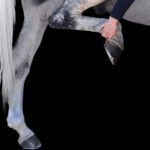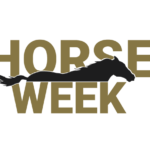
Cincinnati, Ohio, Jan. 15, 2006 — The high points of any U.S. Equestrian Federation annual meeting are always the awards dinners, which salute emotional winners trying to juggle tears, joy and the responsibility of balancing a massive trophy.
One of the most thrilling moments this weekend came when we shared Olympic dressage rider Debbie McDonald’s delight as her “best friend,” Brentina, was named the first Farnam Platform USEF Horse of the Year on Saturday night.
USEF members and the media voted on a slate of outstanding horses in a range of disciplines to pick the star of 2005. Debbie traveled from her Idaho home with Jane Thomas, the daughter of Brentina’s owners, Peggy and Parry Thomas, to sit in suspense all evening and wonder if the chestnut mare would be selected. The outcome of this ballot race was a secret until the presentation, but I had a very strong feeling that the winner would be Brentina, who was third in the 2005 World Cup finals and had a fabulous record for years before that. The owners of all the equine candidates sincerely wished each other luck when they passed in the hallways at the Hilton here, making for a very convivial and sportsmanlike approach to this honor.

Debbie honestly didn’t expect to win, so her reaction to the announcement could best be described as shock and awe.
“I’m shaking. Look at the company we’re in. What an honor just to be nominated!” she said, before walking up to the stage with Jane.
“For me, it’s all about the journey,” Debbie explained to the crowd that cheered her. And aren’t mileposts like Horse of the Year the things that help make that journey so worthwhile?
Afterwards, there was champagne in the bar with a crowd of congratulatory merrymakers. At my request, a trio belted out, “Respect,” the centerpiece of Debbie’s fabulous freestyle at the World Cup finals, a song highlighting a quality the judges too often seemed to lack for Brentina. Then, amazingly, the trio segued on its own into “She’s a Brickhouse,” which was also part of Debbie’s freestyle. “ESP,” winked the band leader.

There were so many great stories that came out of the Horse of the Year dinner. I wish I had time to tell you more, but here’s a quick one: Kris Kennedy of Newtown, Pa., had won the Edencroft Trophy as the national amateur-owner jumper champion on In a Breeze in 1984. This year, the same trophy went to her husband, Michael, on Marco. That practically qualifies the sterling cup as a family heirloom, though a watchful USEF staffer didn’t let the Kennedys stray far with the piece before whisking it back to the display table to shine with the other incredibly valuable pieces of silver.
Another big moment was Friday night’s Pegasus dinner, where Walter Straus wore the silver Jimmy Williams cowboy hat emblematic of the organization’s cherished lifetime service award. Walter, who grew up in Germany until his family fled Hitler, became involved with eventing in America and was a respected trainer as well as a longtime pillar of the USEF’s predecessor group, the American Horse Shows Association.
Perhaps the best testimony to the Texan’s character and love of horses is that all his children became involved in riding and, as he put it, “all my students became friends.” Joining him onstage was his son, Eric Straus, a former AHSA executive director, who has served as an officer of both the USEF and the U.S. Equestrian Team Foundation.

We all got teary-eyed watching a video about the work of the military’s Blue Devils Horse Platoon and the Louisiana State University Equine Studies Program in rescuing the equine victims of the Gulf Coast hurricanes. Representatives of LSU and the platoon, in full uniform, got a standing ovation for the efforts that won them the aptly named, “Heroes for Horses” honors.
Other notable recognition went to Alvin Topping, who received the Sportsmanship Award and Jack Fritz, a founder of everything from the U.S. Eventing Association to the U.S. Pony Club, who couldn’t be present because he recently broke a hip. The sparkling Junior Equestrian of the Year was versatile Arabian and half-Arabian rider Teal Dowling, who had to hike, bike and paddle a canoe in Costa Rica in order to get out of the jungle for her flight to Ohio.
There was also some impromptu partying during the convention. A group including USEF President David O’Connor and the normally staid four-in-hand driver, Tucker Johnson, wound up at a hip-hop club, an evening memorialized on many cell phone cameras. A black knit hat David picked up outside the club found a new home back at the Hilton the next day, sitting atop a placard listing the location of meeting rooms.
What the convention is really about, however, is the business of running the federation and its affiliates. The sausage-making of the rule revision process is never fun, with talk grinding on interminably over what seems like minutiae to all but those who have a stake in the outcome.
A case in point was the debate over the rule against riders holding a dog on a leash while mounted. Apparently there have been several accidents recently in which leashes got tangled in horses’ legs. Duh. This is in the same death-of-common-sense category as having a warning on a shirt saying it shouldn’t be ironed if you’re wearing it.
But things do get accomplished at these meetings and the federation seems to be clicking along, having found a way to address problems and move on. Want an example?
They worked out a method to tackle the tangle caused by a decision to improve the show schedule by arranging dates on a calendar starting Jan. 1 rather than the old method, which had Memorial Day weekend as its starting point. The new approach would have caused shows traditionally linked to a holiday, such as that formidable Labor Day weekend fixture, the Hampton Classic, to be held on a different date in the future. In the case of the Classic, that would have been after all the summer visitors went home. Who would drink the champagne?
“The new system made the problem worse instead of better. We messed up,” said California show manager Larry Langer, who devised it with competition management committee chairman Glen Petty. Together, they worked out the solution: Going back to the old system in 2009, and trying to find compromises that will let shows come up with livable dates in 2007 and 2008.
The scariest moment of the convention came when David — who has led the federation brilliantly since its birth two years ago — reported he had taken a job as technical advisor training the Canadian eventing team. He said it was time for him to get on with his life and his goal of coaching. David left it up to the USEF board members to decide whether this acknowledged conflict of interest was acceptable. Luckily, they decided it was. And let’s face it, the Canadian eventers aren’t much of a threat. Public recognition of David as an Olympic gold medalist, along with his drive, charm and sense of the right course for the federation would have made him hard to replace at this juncture.
There was some intrigue in the air, too, as Alan Balch, president of another USEF predecessor group, USA Equestrian, returned to the board. Balch was at the center of a heated legal battle that raged expensively for several years between USAE and the U.S. Equestrian Team. As part of the settlement that formed the USEF, Balch was barred from the board until this year. While no one said anything publicly about his reappearance, there are some whose wounds from the war have not healed. They were not glad to see him back. Stay tuned on this one.
In the midst of all the politics and fine print, it’s sometimes hard to remember what the annual meeting is really about, and why it’s important.
“Let’s remind ourselves why we’re here, the horses,” David told us in his keynote address. “The decisions we make here do matter and affect countless lives, both horse and human.”






